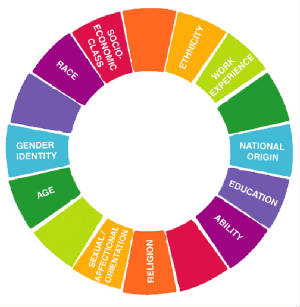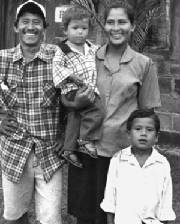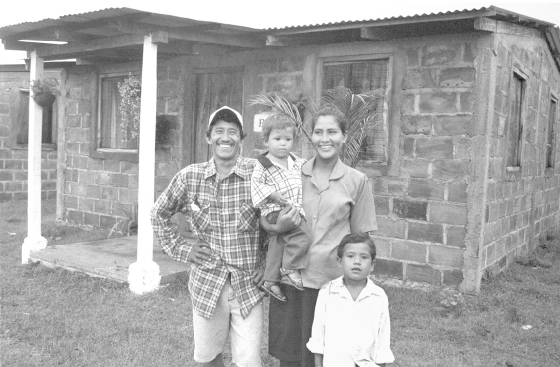 |

The concept of "unmasking diversity" is an important one. Maybe you, like many other Americans, have never
had a conversation with a homeless person or haven't had a friend who is of a different race, class or who
is gay.
If you don't know anyone personally, It's easy, because you have no real world reference, to stereotype people
who are different from you. This makes "those people" into a "thing" rather than a unique person with their
own complicated good and bad attributes.
This transforming a person or group into something less than human, however, is the first step on a continuum towards
prejudice, discrimination and even violence.
The way we think about others, our thoughts, are important.
Each tab examines an issue of diversity and seeks to offer information, exersizes to enlighten and highten awareness,
and links to visual aides or organizations which focus on improving the social problems associated with each issue.
The content on this site seeks to promote peace and acceptance.
Be kind whenever possible. It is always possible.
-the Dalai Lama

Thoughts are powerful. We often make judgements about the moods or behaviors of others based on what we see.
If we saw this unhappy child, for example, we might assume he is sick, tired, tempermental or even neglected. But we
may not be seeing the full picture...

Now, if we expand our view a bit, we can see that we might have made some incorrect assumptions. First of all,
we can now see that the boy is part of a family and judging from the family's expressions, they appear friendly, open and
happy. We are no longer blaming the parents for the child's stoic expression. However, the family still appears
poor based on their clothing and what little background we can make out.
Most Americans will be quick to assume that the parents are probably lazy and that's why they are poor. What other
assumptions might we make about this family?
Now let's widen the picture a bit more.

The boy's father used to work in construction but lost his job when the economy slowed the production of new construction.
The family immigrated from Nicaragua in 1997 and they are here in America legally. The mother works five days a
week as a seamstress and cleans houses on the weekends. The father watches the children during the day and does some
part time janitorial work at night. They live in this small out building on an old plantation in Florida because it
is all they can afford since the father lost his job. The old plantation has about fifteen just homes like
theirs and all are inhabited by renters - most of whom are families.
The bigger picture allows us to understand that this family's problems are not based on individual failures, ethnicity
or legal status but is rooted in society. And unemployment is not just experienced by one boy and his family but by
many across America.
DEVELOPING A
COMMON LANGUAGE
D E F I N I T I O N S
From the pamphlet "Close the Book on Hate"
Ableism
Ableism is prejudice and/or discrimination against people
with mental or physical disabilities.
Ageism
Ageism is prejudice and/or discrimination against people
because of their age.
Anti-bias
Anti-bias is an active commitment to challenging prejudice,
stereotyping and all forms of discrimination.
Anti-Semitism
Anti-Semitism is a prejudice and/or discrimination against
Jews. Anti-Semitism can be based on hatred against Jews because
of their religious beliefs, their group membership (ethnicity)
and sometimes on the erroneous belief that Jews are a “race.”
Bias
Bias is an inclination or preference either for or against
an individual or group that interferes with impartial judgment.
Bigotry
Bigotry is an unreasonable or irrational attachment
to negative stereotypes and prejudices.
Classism
Classism is prejudice and/or discrimination against people
because of their real or perceived economic status.
Culture
Culture is the patterns of daily life learned consciously
and unconsciously by a group of people. These patterns
can be seen in language, governing practices, arts, customs,
holiday celebrations, food, religion, dating rituals, and
clothing, to name a few examples.
Homophobia
Homophobia is the irrational fear of people who are believed
to be lesbian, gay or bisexual.
Multicultural
Multicultural means many or multiple cultures. The United States
is multicultural because its population consists of people from
many different cultures.
Prejudice
Prejudice is pre-judging, making a decision about
a person or group of people without sufficient knowledge.
Prejudicial thinking is frequently based on stereotypes.
Racism
Racism is a prejudice and/or discrimination based on the social
construction of “race.” Differences in physical characteristics
(e.g., skin color, hair texture, eye shape) are used to support
a system of inequities.
Scapegoating
Scapegoating is the action of blaming an individual or group
for something when, in reality, there is no one person or
group responsible for the problem. It targets another person
or group as responsible for problems in society because
of that person’s group identity.
Sexism
Sexism is prejudice and/or discrimination based on gender.
Stereotype
A stereotype is an oversimplified generalization about a person
or group of people without regard for individual differences.
Even seemingly positive stereotypes that link a person or group
to a specific positive trait can have negative consequences.
Discrimination
Discrimination is the denial of justice and fair treatment by both
individuals and institutions in many arenas, including employment,
education, housing, banking, and political rights. Discrimination
is an action that can follow prejudiced thinking.
Diversity
Diversity means different or varied. The population of the United
States is made up of people from diverse races, cultures and places.
Hate Crime
Hate crimes are defined under specific penal code sections
as an act or an attempted act by any person against the person
or property of another individual or group which in any way
constitutes an expression of hostility toward the victim because
of his or her race, religion, sexual orientation, national origin,
disability, gender, or ethnicity.* This includes but is not limited
to threatening phone calls, hate mail, physical assaults, vandalism,
cross burnings, destruction of religious symbols, and fire bombings.
* Elements of crime statutes and protected classifications vary state to state.
Hate Incident
Hate-motivated incidents are defined as behavior which
constitutes an expression of hostility against the person
or property of another because of the victim’s race, religion,
disability, gender, ethnicity, or sexual orientation. Hate-motivated
incidents include those actions that are motivated by bias,
but do not meet the necessary elements required to prove
a crime. They may include such behavior as non-threatening
name calling, using racial slurs or disseminating racist leaflets.
Heterosexism
Heterosexism is prejudice and/or discrimination against people
who are or who are perceived to be lesbian, gay or bisexual.
|
 |
